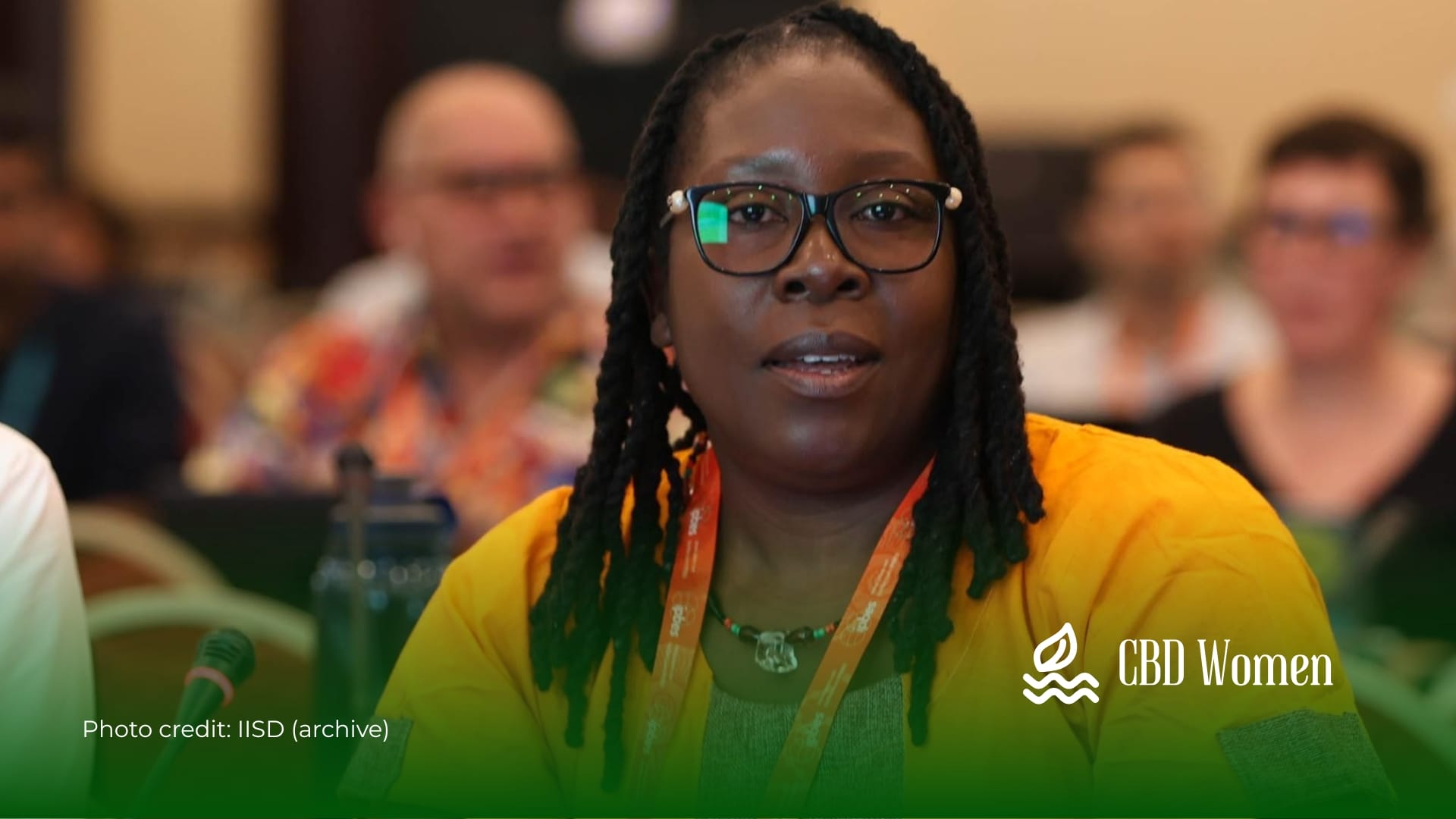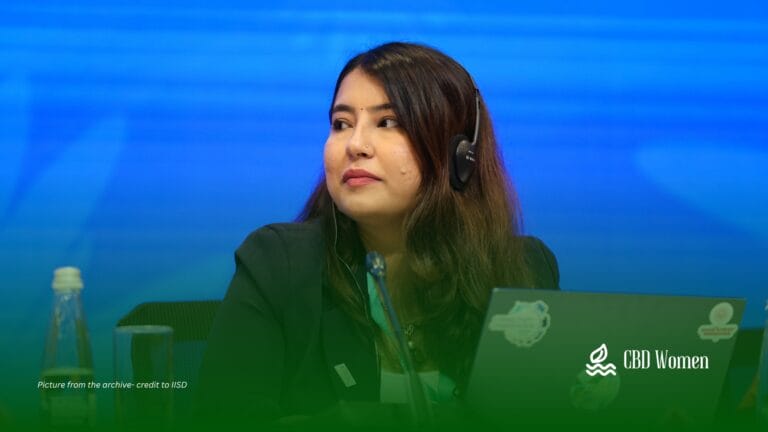By Ms. Alice Kammwamba, Indigenous and local knowledge Coordinator and Project Manager of the Malawi National Ecosystem Assessment, and a CBD Women’s Caucus member
Disclaimer: The views expressed in this blog are those of the author and do not necessarily reflect the official position or opinions of the CBD Women’s Caucus
The world is preparing for a milestone moment: the first Global Report on the Collective Progress in implementing the Kunming-Montreal Global Biodiversity Framework (KM-GBF), a key document that will guide the Global Review at COP17 in 2026.
As the CBD Women’s Caucus representative, I have been deeply involved in the 4th and 5th meetings of the Ad Hoc Scientific and Technical Advisory Group (AHSTAG), ensuring that gender justice and human rights are not afterthoughts but integral pillars of this historic assessment.
This blog takes you behind the scenes of these technical yet transformative discussions where the blueprint for global biodiversity accountability is being shaped.
About the AHSTAG
The AHSTAG is a team of experts established to guide the scientific and technical preparation of the KM-GBF Global Report. Through a series of virtual meetings, members review the structure, data sources, and methodology that will define how the world measures progress on biodiversity.
4th AHSTAG Meeting (9 September 2025): Focused on reviewing peer feedback on the draft annotated outline.
5th AHSTAG Meeting (30 September 2025): Dedicated to finalizing the revised outline and examining data sources that will inform the report.
Representing the CBD Women’s Caucus, Ms. Alice Kammwamba from Malawi actively advocated for gender-disaggregated data, women’s contributions, and the consistent application of Section C principles of the KM-GBF, especially the human rights-based approach and whole-of-society engagement.
Let’s discover What Happened in the Recent Meetings!
The recent meetings have moved from conceptual planning to grappling with the practical challenges of assembling a robust, credible, and inclusive global assessment.
- Fourth Meeting: Digesting the Peer Review (9 Sept 2025)
The core of this meeting was a presentation by a Technical Consultant on the summary of peer-review responses. The Secretariat received 24 submissions (10 from Parties, 14 from Observers), revealing both consensus and significant divergence on the report’s direction. Key highlights from the discussion included:
- Mandate and Scope: Several Parties (like Canada and Argentina) stressed that the outline must strictly adhere to the mandate in COP Decision 16/32 and avoid being overly prescriptive or duplicative.
- Pathways for Action: A major point of debate was whether the report should include an analysis of «possible pathways and actions» to achieve the 2050 goals. While the UK, Norway, and others supported this, Brazil, Canada, and Argentina argued that it oversteps the AHSTAG’s technical mandate. The Secretariat proposed rewording to clarify that the report will provide evidence-based analysis, not policy prescriptions.
- Regional vs. Global Focus: Brazil strongly advocated for deleting all references to a «regional dimension,» arguing the report must maintain a strictly global focus to avoid imbalance. This was supported by IUCN but contrasted with other views that regional data can enrich the analysis.
- Means of Implementation: There was strong support (from the EU, Norway, Canada, Brazil) to expand the section on Means of Implementation (MoI) to explicitly include Target 20 (capacity-building) alongside Targets 18 and 19.
Fifth Meeting: Scrutinizing Sources and the Revised Outline (30 Sept 2025)
The 5th meeting took a deep dive into the “how” of the report — examining the foundations that will shape the Global Report.Review of Information Sources: Participants critically reviewed all proposed data sources, including submissions received in response to official CBD notifications. This was a key opportunity to advocate for the inclusion of gender-disaggregated data and information reflecting women’s contributions.
Review of the Revised Outline: The updated outline, revised based on peer review feedback, was thoroughly examined during the session to ensure clarity, coherence, and balance across sections.
Highlights and Key Discussions
Several issues discussed are of paramount importance to the advocacy goals of the CBD Women’s Caucus:
- Inclusion of Section C and a Human Rights-Based Approach: We successfully advocated, alongside OHCHR and others, for stronger language ensuring that the principles of Section C, including a human rights-based approach, gender equality, and the «whole-of-society» approach, are integrated across the report, not just mentioned in passing. The revised outline is expected to reflect this.
- Data on Women and Marginalized Groups: The peer review highlighted the need to move beyond simply listing groups like «women and youth» to actually integrating their perspectives and data into the analysis. We emphasized that disaggregated data is crucial for a true assessment of progress. The Secretariat confirmed that where possible, indicators will be disaggregated, using the optional classifications set out in the monitoring framework.
- Barriers to Implementation: Brazil and others called for a more detailed analysis of barriers, especially those faced by developing countries. This aligns with our focus on identifying structural barriers that disproportionately affect women, such as a lack of access to finance, land, and decision-making processes.
- Traditional Knowledge: The discussion reinforced the need to include traditional knowledge with the free, prior, and informed consent (FPIC) of Indigenous Peoples and local communities, where women are key knowledge-holders.
Outcomes and Next Steps
Immediate Outcome:
The primary outcome of the 4th meeting was a clear directive to the Secretariat to revise the annotated outline, addressing the peer review comments.
Key changes will include:
- Streamlining to avoid duplication.
- Refining language on «pathways» to be evidence-based but non-prescriptive.
- Strengthening references to Section C and Target 20.
- Clarifying the use of global data to supplement potential gaps in national reports.




